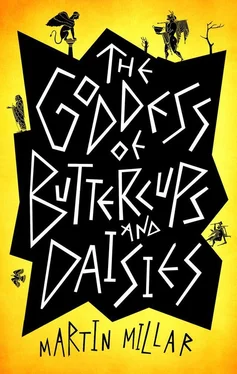Beautiful Earth, mother of all, eldest of all beings.
Who sustains all creatures
All that walk upon the bountiful land,
All that are in the seas,
And all that fly.
Through you, O queen, we are blessed in our children
And blessed in our harvests,
Happy is the man whom you delight to honour!
His land is covered with corn, his pastures are full of cattle,
His daughters skip merrily over the soft flowers of the field.
Thus is it with those whom you honour, O holy goddess.
Hail, Mother of the gods, wife of starry Heaven.
Luxos and Bremusa felt a great warmth spreading from Metris’s hands, through theirs, and into the altar. Metris looked down. At the foot of the altar were one buttercup and one daisy. She nodded and smiled. Not her normal, whole-hearted smile, but something more thoughtful.
‘That’s a little better. We haven’t fully repaired it, but it’s better. It might still work. Anyone coming here as a last resort might still find help.’
Aristophanes was suffering from insomnia. He hadn’t slept properly since the last night of the Dionysia. The crushing gloom may have lifted from the city but it still afflicted the playwright. He thought of the Spartans, riding home with news that they’d signed the treaty. He wondered if they’d be pleased. Most of them would be, he supposed. Even Spartans didn’t like to fight all the time. Most of Athens was certainly pleased. Hyperbolus and his cronies were defeated for the moment, and keeping a low profile in the face of public mockery. Even their discomfiture didn’t bring Aristophanes any pleasure. He hadn’t won the competition. He’d been awarded second place. Just like last year, when his play Wasps had been placed second, even though it was clearly the best comedy at the festival.
He couldn’t believe it had happened again. Peace had been placed second. Eupolis had won, with a play which was inferior to his in every way.
Aristophanes sighed loudly. He felt dull, fatigued, yet still unable to sleep. He paced around the room, then looked out of the window at the dark streets. He saw a line of torches passing by. A procession, coming from a symposium somewhere. There had been a lot of drinking parties in the past few days. Aristophanes had refused all invitations. Hermogenes was no longer speaking to him. He didn’t care. He was sick of the whole city.
Aristophanes knew he wasn’t being entirely rational. The city had made peace. His play had been instrumental in that. There was good reason for rejoicing.
But why was I the only one who had to suffer? It simply isn’t fair.
He sat down. His eyelids were drooping. He rested his head on his hand and gazed at the table in front of him. There were scrolls there, all blank. Normally he wrote every day, but since the Dionysia he’d been unable to compose a word.
Weariness began to overwhelm him. He experienced a brief, dreamlike feeling, and suddenly the Goddess Athena was standing in front of him. She looked just like Phidias’s great statue of her in the Parthenon, with her robe cascading in folds, her bronze helmet pushed back on her head, and a spear in her hand. Aristophanes froze, incapable of movement. He was scared, though she didn’t seem hostile. Fortunately, he hadn’t insulted her in any of his plays.
The goddess regarded him calmly. ‘Aristophanes. It’s time for you to cheer up.’
That was more prosaic than he was expecting. If the Goddess Athena ever chose to appear to him, he hadn’t thought it would be to tell him to cheer up.
‘So you lost to Eupolis,’ she continued. ‘What of it? You helped bring peace to Greece.’
Aristophanes’ fear had receded a little, helped by the goddess’s conversational tone. He managed to utter a few words. ‘I know. Peace is good. But…’
‘But you can’t stand that you lost? Really, Aristophanes, you shouldn’t worry about it. Eupolis’s play will be forgotten in a few years. So will Leucon’s. Your play won’t be. Two thousand years in the future, people will still be reading Peace .’
Aristophanes was startled. ‘Two thousand years? Really?’
‘Yes. When every other Athenian comic dramatist has long been forgotten, your name will still be remembered. Your plays will be published in languages that haven’t even been invented yet.’
Aristophanes was staring somewhere around the goddess’s midriff, not wanting to look her in the eyes, which might be disrespectful, and dangerous. He was moved to glance upwards at the phrase languages that haven’t even been invented yet. He liked that.
‘Your plays will survive through thousands of years, and be read by people in nations that don’t yet exist. They’ll be staged in a future you can hardly imagine. People will be applauding Trygaeus on his flying beetle when Eupolis is no more than a footnote in a history book.’
Aristophanes was still struggling to speak. The Goddess Athena didn’t seem to mind. He supposed she would be used to it.
‘Does this make you feel better?’ she asked.
‘Much better, Goddess.’
‘Good. Now I suggest you brighten up, sleep properly, then start writing your next comedy.’
Athena began to fade from sight, but then, as if changing her mind suddenly, she came sharply into focus again.
‘Oh, and Aristophanes…’
‘Yes?’
‘Send Bremusa back happy, or there will be trouble.’
With that, the Goddess Athena disappeared. Aristophanes’ head snapped back and he came fully awake. He leapt from his chair. It had been a startlingly vivid dream. Or vision, perhaps. The Goddess Athena had appeared to him. He hadn’t quite arrived back in reality when he noticed Bremusa standing in the doorway.
‘I should take this armour off,’ she said. ‘I’ve been wearing it since I arrived in Athens. Do you have a bathing room? With hot water?’
‘Yes.’
‘Take me there. I have two days before I’m due back on Mount Olympus.’
Luxos the poet was more used to the city than the countryside, and toiled as he ascended the steeply rising hills. He had to pick his way carefully through several spiky thickets, and scramble over patches of loose shale and scree. He found it arduous, though it was not quite as hard as it might have been; Luxos had a new pair of sandals, of good quality, his first for some years. Aristophanes had paid him for his help. The payment had been surprisingly generous; in the past few days, the playwright’s mood had dramatically improved. Luxos also had a commission from Theodota to write an ode to her beauty, and several invitations to symposiums held by well-connected citizens, where he would be paid to read and would probably pick up more commissions. His performance in the theatre, and his Hymn to Athena, had been widely praised. Doors were opening all over the city to Luxos, and he was no longer a figure of fun.
‘That’s the good thing about Athens,’ he said, to a small sparrow which looked down at him from a branch. ‘If you show you have talent, you can get a chance.’
He raised his lyre in the direction of the sparrow. ‘Would you like to hear a new poem I’ve been working on about Aphrodite?’
They clothed her with heavenly garments:
on her head was a fine, well-wrought crown of gold,
her earrings were of orichalc and precious gold,
golden necklaces hung over her soft neck and snow-white breasts,
The sparrow chirped in appreciation.
‘It’s just a first draft,’ explained Luxos. ‘I’ll have to ask Metris if she can find out anything more about Aphrodite for me. You’d like Metris. She’s wonderful. I’m going to see her now.’
Читать дальше












